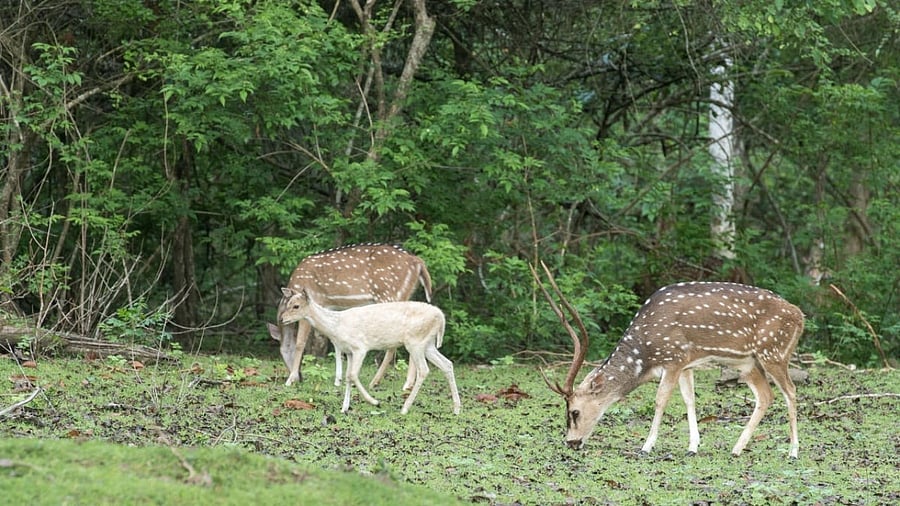
The albino deer sighted in a herd near Taraka backwaters during a wildlife safari in Antharasanthe range of Nagarahole national park in HD Kote taluk of Mysuru district on Wednesday.
Credit: DH Photo/Satish B Aradhya
Hubballi: The Wildlife (Protection) Amendment Act, 2022 has further complicated the scientific study of scheduled species in India as the permission process is resulting in inadvertent delays and denials.
At least six senior researchers confirmed to DH that their applications to study Schedule I and Schedule II species have been held up with the Ministry of Environment, Forest and Climate Change and state forest departments for over three years now.
Earlier, the State Wildlife Board and Research Advisory Committee used to approve the applications after conducting interviews and viewing researchers' presentations. However, after the amendment, approvals for all Schedule I and II species are being issued by the Union government.
Animals like tiger, leopard and elephants, which are endangered, are listed as Schedule 1 species. Wolves, jackals and foxes are categorised as Schedule II.
"Scientific research on flora and fauna is very important for preparing data-based conservation. If getting permission becomes so difficult, then conservation will take a hit," said The Fishing Cat Project co-founder Tiasa Adhya.
Sources in the Karnataka forest department inform DH that applications from renowned herpetologists and batrachologists have been pending with the Union government for at least two years now. "We have not received any communication from the Union government on the reasons for delaying or denying the approval," says an officer in the research wing of the department. The officer believes that one reason for denying the approvals could be due to the handling of Schedule I species.
A Karnataka-based herpetologist, who is currently working on venomous snakes in east India, says that despite having such rich biodiversity, the country lacks even basic information regarding the majority of species in Schedule I and II.
"In foreign countries, there are hundreds of scientific papers on most species available on their land. However, in India, barring tigers, elephants, leopards and to a certain extent king cobras, we hardly have high-quality scientific data on other species. Lack of information will hinder our ability to take up conservation efforts," says the researcher, who does not wish to be named.
Ashwini V Mohan, a postdoctoral researcher currently working in Switzerland says owing to the prolonged waiting period for project approvals, several Indian students in India or elsewhere, are forced to either change their research topics or methods of studying Indian scheduled species. "For a PhD student, the course period is 2-4 years. If getting permission from forest department takes two years, when will they complete their studies, gather data and submit findings. Instead, they would prefer alternative topics that do not need active sampling," she says.
Batrachologist Gururaja K V finds the flaw in the species evaluation system in India. "Unlike in IUCN (International Union for Conservation of Nature), where a species is identified as critical, endangered and other categories in consultation with scientific community, in India species evaluation process has been non-transparent."
He gives the example of Malabar Tree Toad, a Western Ghats endemic toad which is locally abundant. IUCN Global Amphibian Assessment 2 considers it as least concerned, yet listed as Scheduled II species in the amendment of WPA making it difficult to get permission for research. He asks the department to treat researchers as partners and contributors with facts and data in conservation.
Karnataka Forest Minister Eshwar Khandre says the Union government has unanimously taken the powers to allow research on scheduled species. "Lack of permission is hurting our conservation efforts," he says.